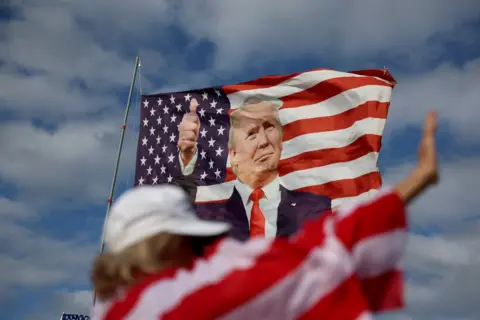Is this indictment a threat to Trump's 2024 campaign?

 Getty Images
Getty ImagesDonald Trump has been indicted for the second time in as many months, this time over his handling of classified documents. But will these new charges change any voters' minds as the Republican runs for president?
After his first indictment in March, many speculated that Mr Trump would pay a political price.
He did not.
In the weeks after a New York City prosecutor brought charges of falsifying business records, Mr Trump surged in Republican polls.
He nearly doubled his lead in his party's race for the 2024 nomination, according to an aggregation of national polls of Republican voters by the website fivethirtyeight.
Mr Trump held his loyal base of supporters while other Republicans rallied around the embattled candidate.
In an April poll of Trump voters by USA Today/Suffolk, two-thirds said that the former president's legal situation did not make a difference. Twenty-seven percent said it would make them more likely to support him.
This time around, he faces seven charges including unauthorised retention of classified files and obstruction of justice.
There is also the possibility of his legal troubles deepening over his alleged interference into the counting of votes in the 2020 election. Prosecutors in Georgia are looking into that.
The weight of multiple indictments could begin to have an effect on Mr Trump's standing.
It could, for instance, allow the message of party rivals like Florida Governor Ron DeSantis, who pitches himself as having Mr Trump's policies without the former president's baggage, to resonate.
After Mr Trump was found liable for sexual assault in a civil trial last month, Republican Senator John Thune speculated that a tipping point could eventually be reached when it comes to the former president.
"It has a cumulative effect," he told CBS News. "People are going to have to decide whether they want to deal with the drama."
Even if that cumulative effect does not move public opinion, it is sure to be a distraction for the former president as he continues to campaign for the Republican nomination.
He already has one court case that makes demands on his schedule. Now he has two. And the trial for these charges could come before the March 2023 date for the New York case.
For now though, his main Republican rivals have rallied to his defence since the latest charges were announced - Mr DeSantis and Mike Pence denounced the move as politically motivated.
This federal indictment also presents some challenges to Mr Trump that his previous indictment did not.
First, it arises from an investigation by a special counsel appointed by the Justice Department, not from a partisan elected prosecutor in New York.
And while Mr Trump and his allies will attempt to tie the indictment to the Biden administration and allege that it is political prosecution of a presidential opponent, it will be harder to make a direct case of partisanship than it has been in the New York City case.
Special Counsel Jack Smith, who has previously prosecuted both Democrats and Republicans, is not New York District Attorney Alvin Bragg.
The charges involved here are also more serious - including conspiracy to obstruct justice and mishandling sensitive national security documents in violation of the federal Espionage Act.
Unlike New York, this is not about allegations of hush money payments to an adult film star and falsified internal business records requiring an unusual interpretation of state law. People have been convicted and sentenced to jail in recent years for the exact kinds of charges Mr Trump now faces.
Republican voters may be able to dismiss the New York case as a personal matter - the kind of drama they have waived off as they voted for the former president in two previous elections. But if more information comes out on the types of classified documents Mr Trump kept, and what he did with them, the matter could be viewed more seriously.
If Mr Trump put national security at risk with his behaviour, that could make a difference in a court of law. And it could matter in the court of public opinion, as well.
Find out more

You can hear more of Anthony's analysis by tuning into Americast, the BBC's US politics and culture podcast, on BBC Sounds or wherever you get your podcasts
And you can follow Anthony on Twitter

